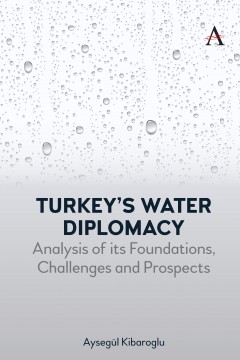Turkey’s Water Diplomacy
Analysis of its Foundations, Challenges and Prospects
By Aysegül Kibaroglu
Science Diplomacy: Managing Food, Energy and Water Sustainably
- About This Book
- Reviews
- Author Information
- Series
- Table of Contents
- Links
- Podcasts
About This Book
‘Turkey’s Water Diplomacy’ first delineates the institutional and legal foundations of transboundary water policy-making in Turkey. In doing so, major actors of water diplomacy at national, regional and international levels are identified and scrutinized. Specific attention is paid to the evolution of transboundary water politics in the Euphrates–Tigris river basin since Turkish water diplomacy and its basic principles have been largely shaped through practices in this strategically important river basin. Situated at the crossroads of the Middle East, the Caucasus and Europe as the country is, Turkey’s transboundary water policy has also been shaped by geographical determinants. Interestingly, Turkey has reflected her experience in one region (i.e., Europe) on practices in other regions. ‘Turkey’s Water Diplomacy’ analyses how Turkey’s harmonization with the European Union has impacted the transboundary water policy discourses and practices, and how these changes have been reflected in its relations with its Middle Eastern neighbours. A historical account of transboundary water relations in the ET basin is enriched with the analysis of the current state of affairs in the region, such as the Syrian civil war and its repercussions on water issues.
It is striking that Turkey was one of the three countries that rejected the UN Watercourses Convention in 1997. The book elaborates on the reasons why Turkey voted against the UN Watercourses Convention. Yet, since the voting of the convention in 1997, there have been changes in Turkey’s stance vis-à-vis international water law, which the book examines and focuses on.
Turkey’s water diplomacy embodies complex water management problems, which can be best understood as a product of competition, feedback and interconnection among natural and societal variables in a political context. Hence, the book adopts the Water Diplomacy Framework with its key elements in making policy-relevant recommendations specifically for Turkey’s water diplomacy.
Reviews
“Aysegül Kibaroglu engages the reader in the various interwoven aspects that together describe Turkey’s water diplomacy. The book provides a detailed account of state administration, NGOs, legal, institutional, and practical matters that each and all play a role in how Turkey manages international water. Given the position of Turkey in a water scarce region, this book is a must read to those interested in water diplomacy.” — Ariel Dinar, Distinguished Professor of Environmental Economics & Policy, University of California, Riverside, USA
Kibaroglu’s kaleidoscopic investigation of Turkey’s water diplomacy is an important academic resource for those who are interested in the subject matter, and constitutes an important contribution to the literature. —International Affairs
Author Information
Ayşegül Kibaroğlu is professor of international relations at MEF University Istanbul, Turkey, specializing in transboundary water politics, international water law, Turkish water policy, political geography and environmental security.
Series
Science Diplomacy: Managing Food, Energy and Water Sustainably
Table of Contents
Acknowledgements; List of Abbreviations; Introduction; 1. Institutional Setting; 2. Water Diplomacy Principles; 3. Turkey’s Evolving Position vis-à-vis International Water Law; 4. The Role of History and Geography in Turkey’s Evolving Water Diplomacy; 5. Analyzing Non- State Actors and Processes in Turkey’s Water Diplomacy Framework; Conclusion; References; Index.
Links
Stay Updated
Information
Latest Tweets



